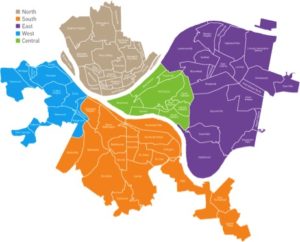Community Impact
The Junior League of Pittsburgh is working toward securing food access for households living below the poverty line in the East End of Pittsburgh.
 *JLP definition of East End of Pittsburgh depicted in Green and Purple
*JLP definition of East End of Pittsburgh depicted in Green and Purple
Childhood hunger, which results from lack of access to adequate nutrition, is being addressed in communities and schools across the country. The Junior League of Pittsburgh is strategizing to expand food access that aims to improve the availability of healthy food locally. Strengthening the capacity of schools to offer healthy meals is essential as children receive most of their nutrition in cafeterias and vending machines. An overhaul of policies, programs and infrastructure is necessary to effect measurable change.
Statistics show that over 16 million children in the U.S. struggle with hunger. Learn about who is affected by hunger, what federal assistance and relief programs are available, how resources such as food pantries, community kitchens and shelters are serving those who need them. You can learn more on how the city of Pittsburgh statistically stands below.
An alarming number of Pittsburgh children are going hungry.
- 20 percent of Pittsburgh children are food insecure, meaning they don’t know when or where their next meal is coming from
- 47 percent of Pittsburgh children live in food deserts where they lack access to fresh fruit and vegetables
- Nearly half of all Pittsburgh families receiving government assistance have children in their homes
- 1 in 5 children in Allegheny County are food insecure
Childhood hunger has lasting effects. Children who are hungry are:
- 2 times MORE likely to suffer from ADHD
- 3 times MORE likely to be suspended from school
- 2 times MORE likely to require special education
- 3 times MORE likely to experience poor health
This staggering data is the Junior League of Pittsburgh motivation to have the greatest impact in our communities. Through our collective efforts with our members and community partners, we are reducing food insecurity through direct service, advocacy, and awareness.